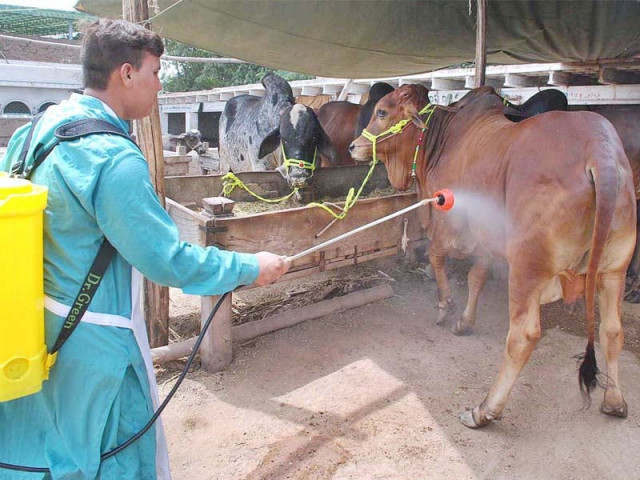As cows return to cities, Congo fears rise
Officials urge caution ahead of Eidul Azha

A worker at a cattle market is spraying sacrificial animals against Congo Virus at Ring Road. PHOTO: APP
One such case has been reported from Bannu while the second has been reported in Buner. But few appear to be aware of the dangers of the virus, especially during Eidul Azha.
“We have heard about the Congo virus from our friend Zakaullah, who is veterinary assistant in my district, but we do not know what it is and what are ‘ticks’ and whether it can impact humans,” said Abdullah, a farmer who rears some cattle which he usually sells during the Eid ul Azha season.
The farmer says he is unaware that the virus is quite fatal with a fatality ratio of 10- 40 per cent.
With just a few weeks until Eidul Azha, the Khyber-Pakhtunkhwa (K-P) health and livestock departments have embarked on an awareness campaign.
Teams comprising staff from the veterinary department have also established check-points where merchants bringing cattle into the provincial capital to spray their animal while entering any district.
But the question arises whether a once-a-year campaign is enough to inoculate an agrarian society where over 60 per cent of the population lives in rural areas surrounded by cattle.
Congo virus
The Crimean–Congo hemorrhagic fever (CCHF) virus occurs commonly among wild and domestic animals. These animals, in turn, serve as amplifying hosts for the virus and also act as a source to transmit it to humans via infected ticks or even animal blood.
Infected humans can also transmit the disease to other humans either by contact or by transfer of infectious blood or bodily fluids.
Dr Shehzad explained that initial symptoms of being infected with the Congo virus include headaches, high fever, back pain, joint pains, stomach pain and vomiting.
Other symptoms include red eyes, a flushed face, a red throat, and petechiae (red spots) on the palate, Dr Shehzad added.
Treatment of the CCHF includes the use of antiviral medications such as Ribavirin. Vaccination and the de-ticking process for animals though remain the best form of protection against infection from the virus.
Another viral disease caused by close contact with animals is the Rift Valley Fever (RVF). However, most human cases of RVF are mild and self-limiting, hence, a specific treatment for RVF has not been established.
The rare, but serious, cases are generally limited to supportive care, he said
Livestock measurements for curbing the virus
So far, only one case of Congo virus has been detected in the province, from Bannu, said K-P Livestock Director Masoom Shah. He added that following the case, all district departments have been directed to use precautionary measures against the virus.
“I have directed the concerned offices in the tribal districts to spray each animal when they enter the country at the Pakistan-Afghanistan border, also check-posts have been established in each district,” Shah said.
He added that they have also established special points at the K-P and Punjab border and all vehicles carrying sacrificial or other milking animals will be subject to a disinfection spray until further directions.
To raise awareness, the livestock official said that they will be conducting seminars, walks, media campaigns and hang banners in various areas.
Ultimately, he said, it was up to the public to spread the message and to ensure that their surroundings are clean and that they are careful and vigilant in the presence of animals, especially during Eidul Azha when human interaction with animals rises significantly.
“My advice is to have your sacrificial animal disinfected at a veterinary department office near you or use special anti-ticks solutions before the animals are sacrificed,” Shah added.
Published in The Express Tribune, August 7th, 2018.\













COMMENTS
Comments are moderated and generally will be posted if they are on-topic and not abusive.
For more information, please see our Comments FAQ